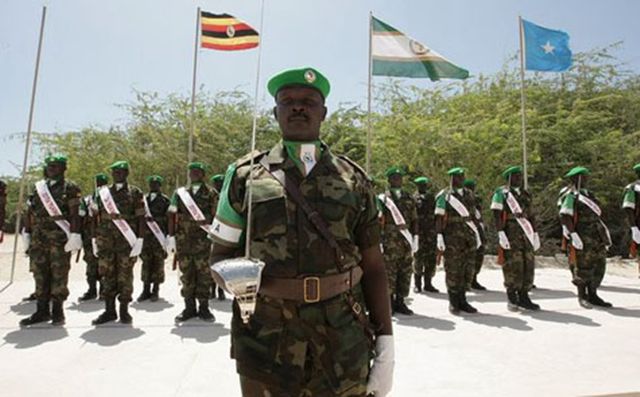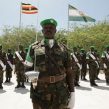
Somalia’s Transitional Government Seeks to Finish Off al-Shabaab This Year
Publication: Terrorism Monitor Volume: 10 Issue: 3
By:

The popularity of Somalia’s al-Shabaab militants is slowly declining for many reasons, including a growing financial crisis and infighting in the movement’s leadership. Somalia’s Transitional Federal Government (TFG) is taking advantage of the group’s current weakness by opening different fronts against the militants. The 2012 assignment for the TFG forces backed by African Union peacekeepers is to drive the militants from Somalia. TFG Deputy Prime Minister Mohamed Ibrahim, Defence Minister Hussein Arab Iise and Somali Forces Commander General Abdikarim Yusuf Aden “Dhagabadan” have on different occasions stated the TFG’s ambition of defeating al-Shabaab within a year. [1]
Al-Shabaab is being pursued by joint forces on two fronts, with troops from the TFG and Kenya in the south and Somali militias allied to the TFG operating in league with Ethiopian force in the west, forcing al-Shabaab to fall back to their strongholds. On the last day of 2011 Ethiopian troops and TFG-allied militias seized the strategic town of Beledweyne (Hiraan Province) from al-Shabaab forces (Shabelle Media Network [Mogadishu], December 31, 2011; Radio Muqdisho, December 31, 2011; Bar-kulan Radio [Mogadishu], December 31, 2011). Al-Shabaab had earlier struck at the Ethiopians in Beledweyne on January 24 with a suicide-bombing that collapsed a building occupied by Ethiopian troops. Al-Shabaab claimed to have killed ten Ethiopians in the attack (Raxanreeb Online, January 24; BBC, January 24). Ethiopia is interested in withdrawing its force from Hiraan Province and the African Union Mission in Somalia (AMISOM) has pledged to replace the Ethiopian troops in the coming weeks (Garowe Online, January 14). The loss of Beledweyne led to al-Shabaab’s withdrawal from Buulo Burde, another important town in central Somalia.
TFG forces are also pressuring the Islamist fighters in the southwest Somalia region of Bakool, which borders Ethiopia. TFG forces commander General Abdikarim Yusuf Aden announced that the establishment of new frontlines against al-Shabaab was part of this year’s assignment to sweep al-Shabaab out of Somalia (Somali National News Agency/Radio Muqdisho, January 3).
Somali Deputy Prime Minister Muhammad Ibrahim and Defense Minister Hussein Arab Iise have both called 2012 the year of liberation. The campaign to retake Somalia has already begun. On January 20, TFG forces backed by African Union peacekeepers attacked the last al-Shabaab bases in Mogadishu. The offensive succeeded in ousting the movement from the capital and even resulted in the seizure of al-Shabaab bases beyond the capital. The spokesman of the African Union Mission in Somalia (AMISOM), Lieutenant Colonel Paddy Ankunda, said the operation was a major step: "This is the first time AMISOM has been able to secure an area outside the parameters of the city, allowing us to defend greater Mogadishu from the exterior." [2]
Mogadishu has been a key priority for the government, which has been fighting to gain control of city since 2009. Pushing al-Shabaab out of the capital is the biggest achievement made by Somali soldiers and AMISOM since the AU peacekeeping mission began five years ago. However, it is unlikely that the operation will restore Mogadishu to full peace and security. When al-Shabaab pulled out from Mogadishu last August, TFG and AMISOM forces were compelled to consolidate their control of the city slowly. “With the failure of Somali government soldiers to occupy the [whole] city, al-Shabaab returned to some strategic places and accomplished their guerilla war which defused government and AMISOM soldiers in Mogadishu.” said Abdiwali Osman, a Mogadishu-based political analyst. [3]
General Abdikarim Yusuf Aden said the on-going military offensive against al-Shabaab was the latest attempt to eliminate the group, which was threatening to advance to areas close to Mogadishu such as Lower Shabelle’s Elasha Biyaha and Jowhar, about 90 km north of Mogadishu. [4] AMISOM is currently preparing the second phase of the mission, which is to expand government administration into the whole country. In September 2011, AU representative Wafula Wamunyinyi said that the number of AU peacekeepers on the ground was only sufficient to deal with Mogadishu, but there are now pledges from Uganda, Burundi, Djibouti and Sierra Leone to provide enough troops to cover the rest of Somalia. So far, however, only two hundred soldiers from Djibouti have arrived to reinforce AMISOM. [5]
The African Union extended the AMISOM mandate a further 12 months on January 5 to take advantage of the unique opportunity created by the operations currently being conducted against al-Shabaab in different parts of Somalia. However, al-Shabaab remains active in the capital through a series of grenade attacks, assassinations and roadside bombings (AFP, January 19; Garowe Online, January 29). According to the movement’s military spokesman, Shaykh Abdul Aziz Abu Mus’ab, the war between Shabaab forces and TFG/AMISOM troops has entered a new phase and encouraged civilians to avoid being around Somali government bases. [6]
Nevertheless, al-Shabaab fighters are not far from Mogadishu. Their closest stronghold is Elasha Biyaha, just 20 km southwest of Mogadishu. Although government forces have seized strategic bases from al-Shabaab in Mogadishu, the more sophisticated fighters of al-Shabaab and their commanders are believed to have remained in the city. As the movement promised, these fighters have launched a wave of asymmetric attacks such as suicide bombings, ambushes and IED attacks in the streets and government bases of Mogadishu. Government soldiers and AMISOM peacekeepers who failed to secure Mogadishu after al-Shabaab’s withdrawal in August are now trying to do in one year something they failed to do in the previous five years – eliminate Somalia’s resilient Islamist militants.
Muhyadin Ahmed Roble is a Somali journalist who writes for SomaliaReport and AfricaNews as a correspondent based in Nairobi.
Notes:
1. State-owned Muqdisho Radio interview with Defence Minister Hussein Arab, December 31, 2011.
2. Press Conference held by AMISOM spokesman Lieutenant Colonel Paddy Ankunda, Mogadishu, January 20, 2012.
3. Author’s interview with Abdiwali Osman, political analyst, Mogadishu, January 23, 2012.
4. Somali National News Agency interview with TFG forces commander General Abdikarim Yusuf Aden “Dhagabadan,” January 2, 2012.
5. Press conference held by Wafula Wamunyinyi, the Deputy Special Representative of the Chairperson of the AU mission for Somalia, Nairobi, September 21, 2011. For the Djibouti contingent, see AFP, December 20, 2011.
6. Press conference via telephone held by al-Shabaab military spokesman Shaykh Abu Mus’ab, January 21, 2012.





